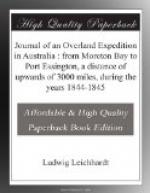During the night, a thunder-storm passed to the southward, but did not reach us; at 10 o’clock we observed very vivid lightning to the westward: the wind was from the north and north-east.
Dec. 31.—We travelled along the banks of the creek towards the north-east, but scarcely accomplished six miles, in consequence of its tortuous course. The water-hole which I had found when reconnoitring, was dried up, and we were glad to find a shallow pool, of which our thirsty cattle took immediate possession. The sand in the bed of the creek looked moist, but no water was found, after digging to a depth of five feet. The immediate neighbourhood of the creek was in some places open, in others covered with a shrubby Acacia, with long glaucous, and rather fleshy phyllodia. On both sides of the high banks are deep hollows, and chains of ponds, surrounded with reeds; but now quite dry, and covered with the dead shells of Limnaea, Paludina, and Unio.
Mr. Roper found an Agama, with light grey on the back, and a yellow belly. A small Chlamy-dophorus, (Jew lizard of the Hunter) was also seen, and is probably identical with the animal inhabiting the banks of that river. Brown accompanied me to reconnoitre the country; and we had scarcely travelled two miles along the creek, when my attention was attracted by the remains of a hut, consisting of a ridge pole, and two forked stakes, about six feet high, both having been cut with a sharp iron tomahawk. Neither of us doubted that this was the work of a white man, probably a runaway from the settlement at Moreton Bay. A few miles farther we came to an anabranch of the creek, which turned considerably to the westward. I followed it, and found a shallow watercourse that came out of the scrub, which I also examined in search of water. It led me to another deep channel within the scrub, which looked unusually green, and contained some very large water-holes; but there was no water in them. Turning round one of its bends, we saw a column of thick smoke rising from its left bank, near a fine pool of water. It was evident that a camp of natives was before us; we rode cautiously up to the water, near which we saw their numerous tracks, and then stopped to look around, but without dismounting. We were, however, very soon discovered by one of them, who, after staring at us for a moment, uttered a cry, resembling the word “whitefellow,” “whitefellow,” and ran off, followed by the whole party. We then rode up to the camp, and found their dinner ready, consisting of two eggs of the brush turkey, roasted opossums, bandicoots, and iguanas. In their “dillis,” (small baskets) were several roots or tubers of an oblong form, about an inch in length, and half an inch broad, of a sweet taste, and of an agreeable flavour, even when uncooked; there were also balls of pipe-clay to ornament their persons for corroborris. Good opossum cloaks, kangaroo nets, and dillis neatly worked of koorajong bark, were strewed about; there were also




